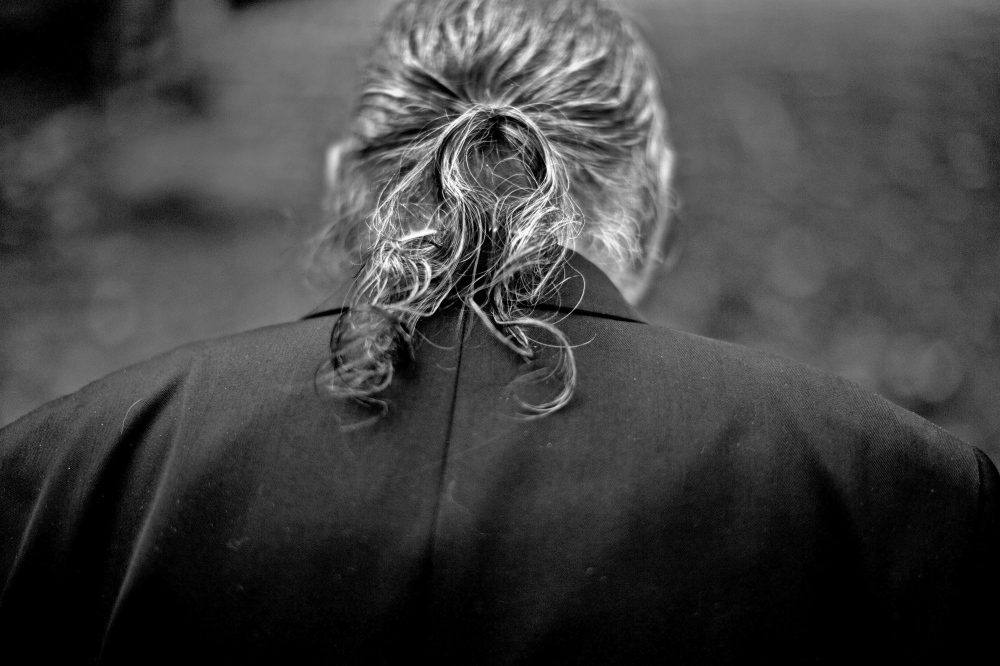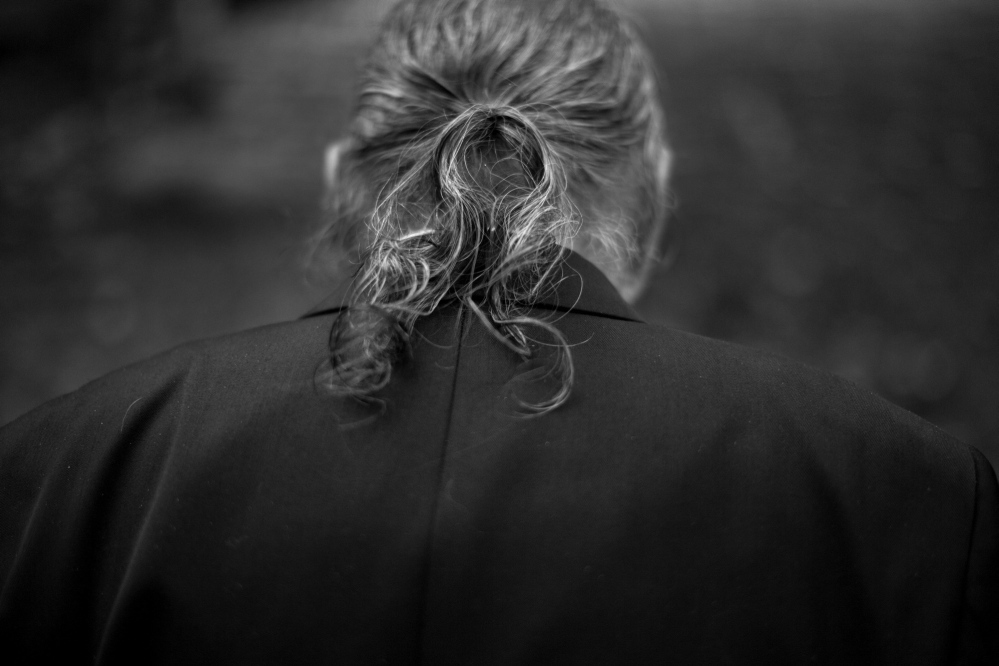
I
t was mid-May in the easternmost city in the United States, an island town perched on the ragged, arrestingly beautiful fringe of the country, separated from Canada and the rest of Maine by swift-moving 20-foot tides and attendant whirlpools. Eastport’s last snowbanks had melted, the daffodils had sprung from the soil, and a young attorney from the Bronx was able to walk to work.
Don Gellers, 28, arrived at his office on Water Street, a former storefront in a late 19th century block kitty-corner from Eastport’s imposing granite Post Office building, itself testimony to the city’s past prosperity. The sardine plants that once brought the city wealth were shadows of their former selves, some abandoned on their piers. Gellers, standing on the sidewalk of its main drag, looked entirely out of place.

The young lawyer was short and intense, with shaggy blond hair and an expensive-looking tweed suit. He may have been puffing on a pipe, as he would later do when sitting for a newspaper portrait. A journalist who came to know him well once wrote that his first impression of Gellers “was one of meeting a young, old, friendly, tweedy sheepdog, if that makes any sense.”
His secretary informed him that he would soon be having a guest: The governor, he said, was coming to call.
The governor, he thought, as he stepped into his office and seated himself at his battered desk. It was surrounded by precariously stacked heaps of law books, some propped up with wooden planks. How could the governor be coming to see me?
When the governor arrived, Gellers still wasn’t sure what to think. The man standing before him was 71, bespectacled, with snow-white hair and a complexion and features that suggested he was not, like 99.4 percent of people in the state, Caucasian. Gellers had seen many pictures of John Reed, the governor of Maine, since moving to Eastport a few months earlier; this clearly was not him.
“Three of our women have been arrested for sitting on our own land,” the man announced, only furthering the young lawyer’s confusion. What did he mean “our women,” Gellers wondered, and what did he mean by “our own land”?
The man, George Francis, looked at him with amusement. “We’re Indians!” he proclaimed.

I
ndians? Gellers didn’t even know there were Indian tribes in Maine, or that they had trust lands and governors. He was so new to the area, so focused on starting his first law practice, that he’d somehow missed the presence of the Passamaquoddy Indian reservation at Pleasant Point, where George Francis was governor and through which all land traffic to and from Eastport must pass.
He was unaware of the existence of a second, larger Passamaquoddy reservation 45 miles to the northwest at Indian Township, where the recent arrests had occurred; that each reservation had a governor or that together they were home to 580 Indians, most living in poverty dire even by the standards of Washington County, the poorest in New England.

He didn’t know that, as Indians, Francis’ people couldn’t vote in state elections or get their hair cut by the barbers of Princeton, just over the bridge from Indian Township. Or that, with rare exceptions, no Indian could get a job with the area’s primary employers, the woolen mill in Eastport and the paper mill in Baileyville. Or that no Indian had ever served on a Washington County grand jury and that no white person had ever been convicted for killing an Indian, a not infrequent occurrence that was rarely seriously investigated.
He didn’t know that 70 years earlier, state courts had denied the Passamaquoddy their treaty rights to hunt and fish on their land on the grounds that the tribe had now lacked sovereignty and, thus, did not exist. He didn’t know that thousands of acres of their treaty lands had been taken, and that Indians weren’t even allowed to cut wood on the land that remained. He didn’t know that because the Indians were forbidden both outside jobs and access to the resources to sustain themselves, most were dependent on food and firewood parcels distributed at the whim of the state Indian agent, the arbitrary and much-feared retired fish inspector Hiram Hall, who had the power of life and death over his wards.
Most critically, young Gellers was blissfully unaware that no attorney in Washington County was willing to represent the tribe in this or almost any other matter of consequence. Gov. Francis had already made the rounds and been shown the door by each. Gellers, the peculiar young man from away, was his last stop. And Gellers seemed perfectly willing to hear the chief’s grievances, oblivious to the grief it could bring down upon his own head.
It would be a conversation that would change the history of Maine, ultimately empowering its native people, and making Gellers the target of a state-sponsored conspiracy that would drive him out of Maine and the country.

F
rancis apprised Gellers of recent events at Indian Township, where a white man was accused of a land grab. The Indians, led by that reservation’s governor, John Stevens, had made an appointment with Maine Gov. Reed and earlier that winter had driven the four hours to the State House in Augusta to seek his administration’s intervention on their behalf. Reed kept them waiting for five hours, only to tell them he was not willing to help them. His attorney general, Frank Hancock, said if they didn’t like it, they could sue. The Indians – who couldn’t afford a hotel room and had eaten all of the bologna sandwiches they had packed – drove home hungry and in the dark.
Indians on both reservations were furious when they heard how their delegation had been treated. “This is one time all the Indians are interested,” Francis warned state officials, “and will be fighting to the finish.”
The morning before Gov. Francis’ visit to Gellers’ office, 75 Indians had descended on the disputed land, where the white owner of a cluster of tourist cabins sought to build a road. Five men stood blocking the road site. A group of women – including Gov. Stevens’ wife – sat on a gravel pile meant to form the roadbed. At lunchtime, however, all but 10 Indians went home to eat. The police arrived, detained the five men they found and arrested the women, taking them to the Calais jail.
Now they needed a lawyer.
Gellers asked if the governor’s people had proof that they owned this land. “We have treaties,” Francis said. Treaties?, Gellers wondered. With whom? With the French Kingdom that once claimed eastern Maine? Pre-Revolutionary Britain? The governor’s answer floored him.
“With Massachusetts.”
But how do you know?
There was a moment of silence. Francis responded slowly: “Oh, everybody knows that.”
By the end of the conversation, Gellers agreed to represent not only the Indian women in the Calais jail, but the tribe’s claims to thousands of acres and millions of dollars given to them under a forgotten, 170-year-old treaty. The two men shook hands, and Francis headed out of the office.
An unlikely, formidable alliance had been formed, one whose reverberations would quickly be felt in Augusta and eventually travel all the way to the halls of the U.S. Capitol.

O
n one hand was George Francis, 71, who had grown up at Pleasant Point, fought in the First World War, and earned a college degree at the Carlisle Indian Industrial School in Pennsylvania. But at home in the 1920s the only work he could find was to smuggle liquor from Canada across the bay. He moved to Detroit, where he worked at the Ford Motor Co. for 40 years. He retired in 1957, returned home, and began fighting, loudly and boisterously, for his people.
At a time when few Indians dared to challenge white authorities, Francis was in the faces of all of them. In short order he was elected chief at Pleasant Point and began sending out a fusillade of pointed letters to state and federal authorities of all sorts, denouncing how the state was handling his people’s affairs – and all the money the state was collecting from the contracts it doled out to outside loggers to cut the Indians’ timber. State-maintained sewerage systems on the reservations were overflowing, forcing Indian Township residents “to drink their own sewage.” The longtime Indian agent, Hiram Hall, was a man with “a nasty Venom tongue like a rattlesnake,” who denied food, firewood, dental care, and even children’s milk allowances to Indians who questioned his rule; one woman, Viola Homan had starved to death as a result, Francis claimed, while Alice Dana had frozen to death for lack of fuel. The state claimed it couldn’t afford to hire so much as a resident nurse to attend to the Indians’ medical needs, yet Francis charged it squandered funds on inflated oil, school busing and school lunch invoices. When Francis appeared in Augusta to examine his tribe’s financial accounts he was denied access by an assistant attorney general.
“As long as I live, I will tell the whole U.S.A. the condition and mismanagement in regards to your department in handling our affairs,” he wrote the state director of Indian Affairs, Paul McClay.
In response, state officials were quietly working behind the scenes to take Francis down. Donald Brown, supervisor of Indian Affairs at the state Health and Welfare Department, instructed Indian agent Hall to withhold food and other disbursements to Francis while he worked to withhold the governor’s $4 monthly salary. Seeking a pretext to cut off other benefits, McClay wrote to the Ford Motor Co. asking for information on Francis’ pension. The governor, McClay wrote his boss, “is obviously a senile old gentleman who is rapidly becoming more and more bitter against Mr. Hall and everyone and everything concerned with the Department.”

I
f Francis was bitter and angry, his new ally, Don Gellers had enough idealism and naivete for the both of them. Raised in a broken family in the Bronx and Queens, he had excelled in school and at law school prepared a legal brief for his professor that so impressed Brooklyn Supreme Court Judge Nathan Sobel, he took the unusual step of praising it in his written decision as the best prepared he had encountered. After an internship at the United Nations, Gellers moved to Eastport with his half-Filipino wife – a painter – burning with, as he would later put it, “a love of justice.” In newspaper portraits he smoked a pipe. After hours, he and his friends sometimes smoked marijuana.
The couple stuck out in Eastport like sore thumbs. Essentially an island community, Eastport in the 1960s was decidedly not Berkeley or Greenwich Village. Perched on the eastern fringe of the country – with 20-foot tides and staggering views of an archipelago of Canadian islands – it was a fishing and cannery town fallen on hard times. In 50 years it had lost more than half of its population and most of its employers, giving the town an eerie, empty, desperate feeling. Most of its people were terribly poor, except in comparison to the Passamaquoddy reservations up the road. The civil rights and counterculture movements were just beginning, and neither had yet reached the shores of Passamaquoddy Bay.
Pot-smoking, Ivy League-educated New Yorkers espousing countercultural ideas weren’t welcome in most circles. Parking his car in front of the old WaCo Diner on his first trip to town, Gellers attracted the attention of a local policeman who demanded to see Gellers’ license, presumably for the “offense” of having out-of-state plates. “This is an island community in Maine, and they don’t accept you if you’re from the next town,” says Frances Tomah, a white divorcee who moved to Eastport from New York with her five children in 1966 and was for a time Gellers’ office assistant. “He and his wife had a very hard time of it.”
“At the time I thought he was raunchy, but there was such an innocent side to him,” adds Tomah, who later married a Passamaquoddy man. “I believe he really thought he could save the world by turning them on to peace and love and turning guns into plowshares. The days of ‘tune in and drop out’ were there, and he was a firm believer that one of his missions was to tune in the world.”
William Williamson, the Press Herald reporter who would cover the jaw-dropping events that soon followed, put it this way: “I probably knew Gellers as long and as well as anyone in Maine, and the adjectives I would use to describe him would include generous, inconsiderate, brilliant, foolishly stubborn, studious, reckless and, most of all, unpredictable.”
He wanted to be governor of Maine, Williamson would add. “He might have made it too, except for his personal Achilles’ heel,” his unrigorously concealed use of marijuana.
Francis and Gellers set to work. Soon, each would have his strengths and weaknesses put to the test in almost every way imaginable. For there were dark forces out there, including men of violence, some quite capable of killing those who stood in their way. And one night five such men would walk right into George Francis’ living room.
Colin Woodard can be reached at 791-6317 or at:
cwoodard@pressherald.com
Coming tomorrow:
Out-of-state hunters, in search of girls
Send questions/comments to the editors.






Success. Please wait for the page to reload. If the page does not reload within 5 seconds, please refresh the page.
Enter your email and password to access comments.
Hi, to comment on stories you must . This profile is in addition to your subscription and website login.
Already have a commenting profile? .
Invalid username/password.
Please check your email to confirm and complete your registration.
Only subscribers are eligible to post comments. Please subscribe or login first for digital access. Here’s why.
Use the form below to reset your password. When you've submitted your account email, we will send an email with a reset code.